Schools as Organisations: Education System Analysis and Report
VerifiedAdded on 2020/06/04
|31
|10447
|72
Report
AI Summary
This report provides a comprehensive analysis of schools as organizations, examining various facets of the education system. It begins by exploring early years education, including entitlements and provisions, and then delves into the characteristics of different school types, such as community, voluntary controlled, and specialist schools. The report also covers post-16 options for young people, strategic purposes of educational authorities, and the roles of external professionals. Furthermore, it discusses school values, methods of delivering missions and aims, relevant laws and codes, and the impact of legislation and regulatory bodies. The report also investigates school policies and procedures, their development, and communication. Finally, it examines the roles of national and local government, schools themselves, and other organizations in shaping education policy and practices. The report offers insights into the multifaceted nature of schools and the broader educational landscape.
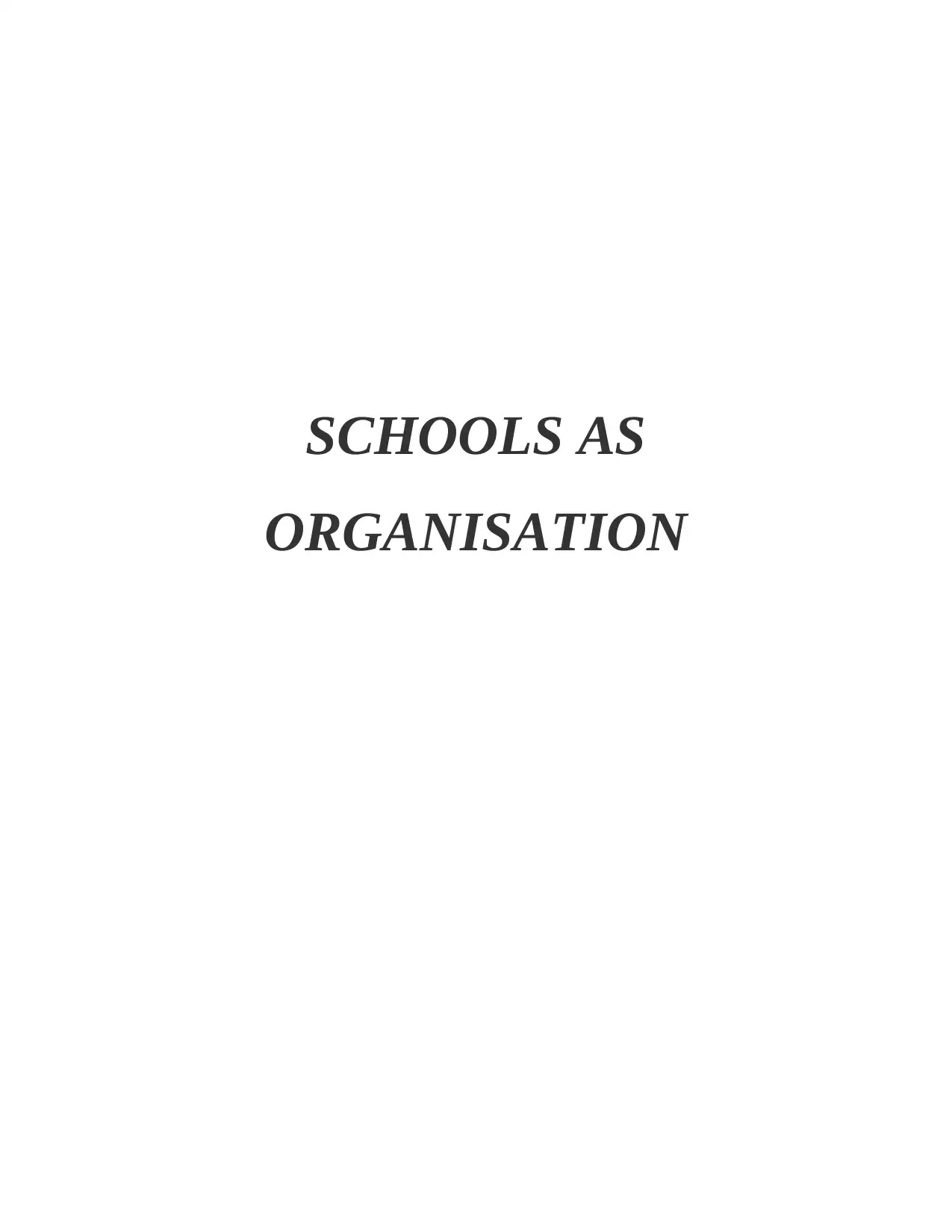
SCHOOLS AS
ORGANISATION
ORGANISATION
Paraphrase This Document
Need a fresh take? Get an instant paraphrase of this document with our AI Paraphraser
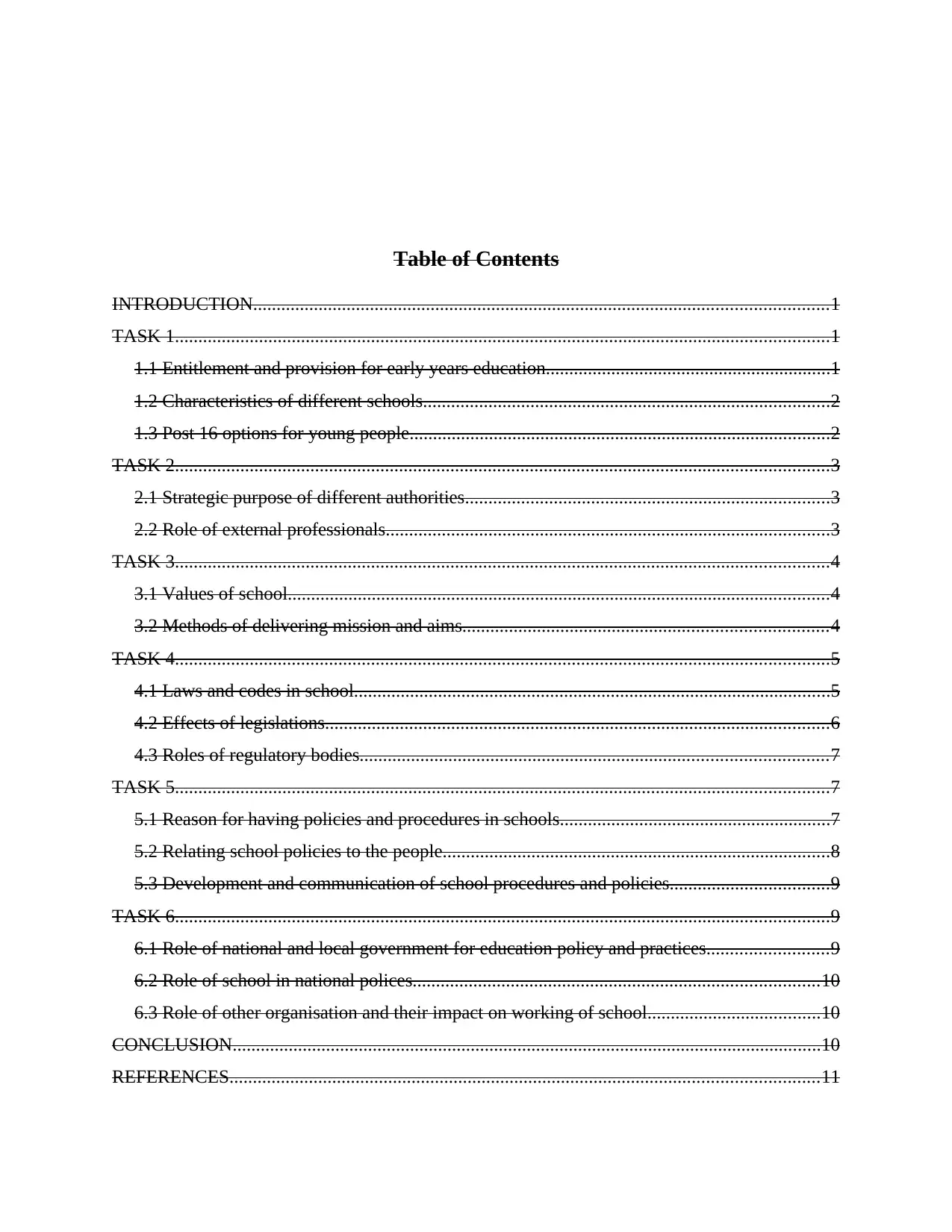
Table of Contents
INTRODUCTION...........................................................................................................................1
TASK 1............................................................................................................................................1
1.1 Entitlement and provision for early years education.............................................................1
1.2 Characteristics of different schools.......................................................................................2
1.3 Post 16 options for young people..........................................................................................2
TASK 2............................................................................................................................................3
2.1 Strategic purpose of different authorities..............................................................................3
2.2 Role of external professionals...............................................................................................3
TASK 3............................................................................................................................................4
3.1 Values of school....................................................................................................................4
3.2 Methods of delivering mission and aims..............................................................................4
TASK 4............................................................................................................................................5
4.1 Laws and codes in school......................................................................................................5
4.2 Effects of legislations............................................................................................................6
4.3 Roles of regulatory bodies....................................................................................................7
TASK 5............................................................................................................................................7
5.1 Reason for having policies and procedures in schools..........................................................7
5.2 Relating school policies to the people...................................................................................8
5.3 Development and communication of school procedures and policies..................................9
TASK 6............................................................................................................................................9
6.1 Role of national and local government for education policy and practices..........................9
6.2 Role of school in national polices.......................................................................................10
6.3 Role of other organisation and their impact on working of school.....................................10
CONCLUSION..............................................................................................................................10
REFERENCES..............................................................................................................................11
INTRODUCTION...........................................................................................................................1
TASK 1............................................................................................................................................1
1.1 Entitlement and provision for early years education.............................................................1
1.2 Characteristics of different schools.......................................................................................2
1.3 Post 16 options for young people..........................................................................................2
TASK 2............................................................................................................................................3
2.1 Strategic purpose of different authorities..............................................................................3
2.2 Role of external professionals...............................................................................................3
TASK 3............................................................................................................................................4
3.1 Values of school....................................................................................................................4
3.2 Methods of delivering mission and aims..............................................................................4
TASK 4............................................................................................................................................5
4.1 Laws and codes in school......................................................................................................5
4.2 Effects of legislations............................................................................................................6
4.3 Roles of regulatory bodies....................................................................................................7
TASK 5............................................................................................................................................7
5.1 Reason for having policies and procedures in schools..........................................................7
5.2 Relating school policies to the people...................................................................................8
5.3 Development and communication of school procedures and policies..................................9
TASK 6............................................................................................................................................9
6.1 Role of national and local government for education policy and practices..........................9
6.2 Role of school in national polices.......................................................................................10
6.3 Role of other organisation and their impact on working of school.....................................10
CONCLUSION..............................................................................................................................10
REFERENCES..............................................................................................................................11

⊘ This is a preview!⊘
Do you want full access?
Subscribe today to unlock all pages.

Trusted by 1+ million students worldwide
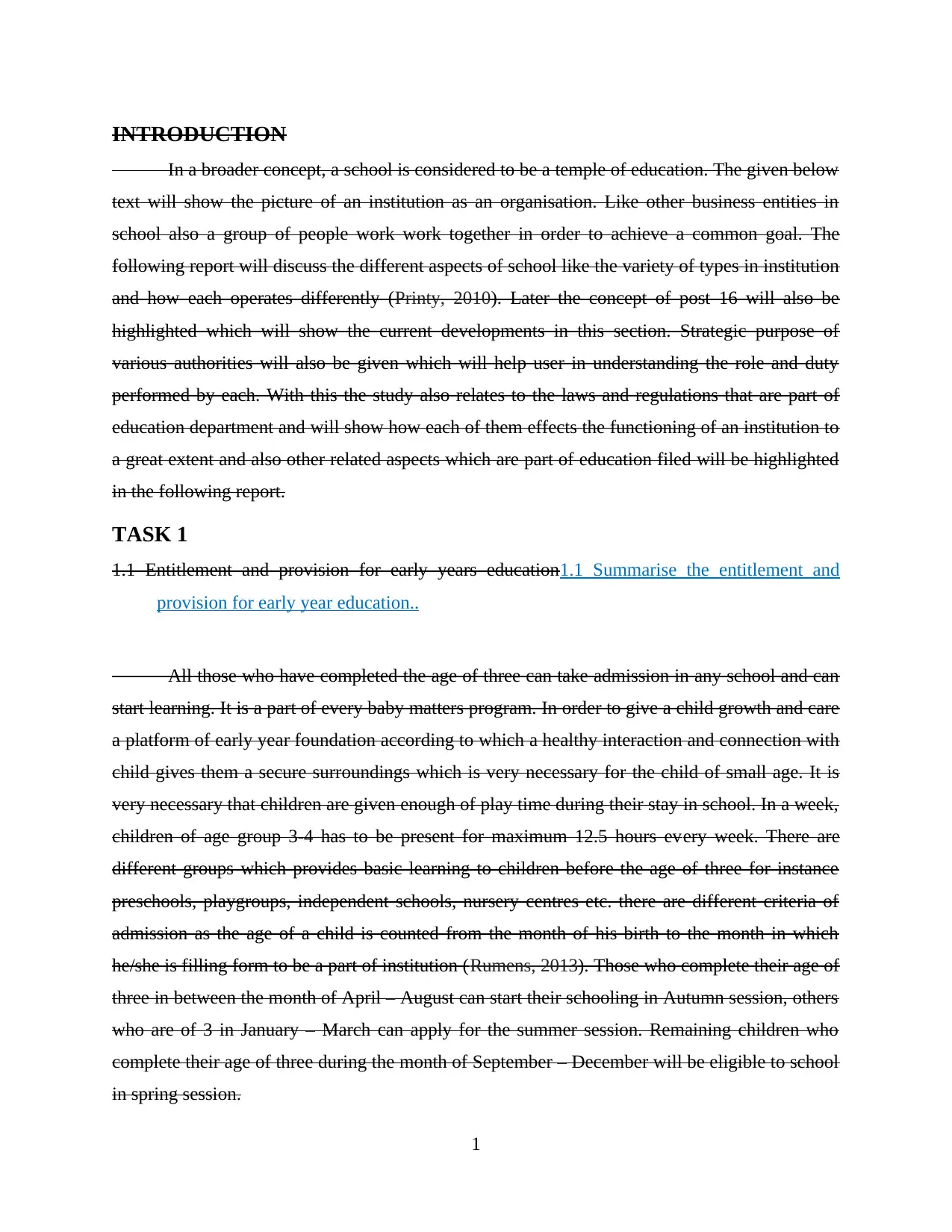
INTRODUCTION
In a broader concept, a school is considered to be a temple of education. The given below
text will show the picture of an institution as an organisation. Like other business entities in
school also a group of people work work together in order to achieve a common goal. The
following report will discuss the different aspects of school like the variety of types in institution
and how each operates differently (Printy, 2010). Later the concept of post 16 will also be
highlighted which will show the current developments in this section. Strategic purpose of
various authorities will also be given which will help user in understanding the role and duty
performed by each. With this the study also relates to the laws and regulations that are part of
education department and will show how each of them effects the functioning of an institution to
a great extent and also other related aspects which are part of education filed will be highlighted
in the following report.
TASK 1
1.1 Entitlement and provision for early years education1.1 Summarise the entitlement and
provision for early year education..
All those who have completed the age of three can take admission in any school and can
start learning. It is a part of every baby matters program. In order to give a child growth and care
a platform of early year foundation according to which a healthy interaction and connection with
child gives them a secure surroundings which is very necessary for the child of small age. It is
very necessary that children are given enough of play time during their stay in school. In a week,
children of age group 3-4 has to be present for maximum 12.5 hours every week. There are
different groups which provides basic learning to children before the age of three for instance
preschools, playgroups, independent schools, nursery centres etc. there are different criteria of
admission as the age of a child is counted from the month of his birth to the month in which
he/she is filling form to be a part of institution (Rumens, 2013). Those who complete their age of
three in between the month of April – August can start their schooling in Autumn session, others
who are of 3 in January – March can apply for the summer session. Remaining children who
complete their age of three during the month of September – December will be eligible to school
in spring session.
1
In a broader concept, a school is considered to be a temple of education. The given below
text will show the picture of an institution as an organisation. Like other business entities in
school also a group of people work work together in order to achieve a common goal. The
following report will discuss the different aspects of school like the variety of types in institution
and how each operates differently (Printy, 2010). Later the concept of post 16 will also be
highlighted which will show the current developments in this section. Strategic purpose of
various authorities will also be given which will help user in understanding the role and duty
performed by each. With this the study also relates to the laws and regulations that are part of
education department and will show how each of them effects the functioning of an institution to
a great extent and also other related aspects which are part of education filed will be highlighted
in the following report.
TASK 1
1.1 Entitlement and provision for early years education1.1 Summarise the entitlement and
provision for early year education..
All those who have completed the age of three can take admission in any school and can
start learning. It is a part of every baby matters program. In order to give a child growth and care
a platform of early year foundation according to which a healthy interaction and connection with
child gives them a secure surroundings which is very necessary for the child of small age. It is
very necessary that children are given enough of play time during their stay in school. In a week,
children of age group 3-4 has to be present for maximum 12.5 hours every week. There are
different groups which provides basic learning to children before the age of three for instance
preschools, playgroups, independent schools, nursery centres etc. there are different criteria of
admission as the age of a child is counted from the month of his birth to the month in which
he/she is filling form to be a part of institution (Rumens, 2013). Those who complete their age of
three in between the month of April – August can start their schooling in Autumn session, others
who are of 3 in January – March can apply for the summer session. Remaining children who
complete their age of three during the month of September – December will be eligible to school
in spring session.
1
Paraphrase This Document
Need a fresh take? Get an instant paraphrase of this document with our AI Paraphraser
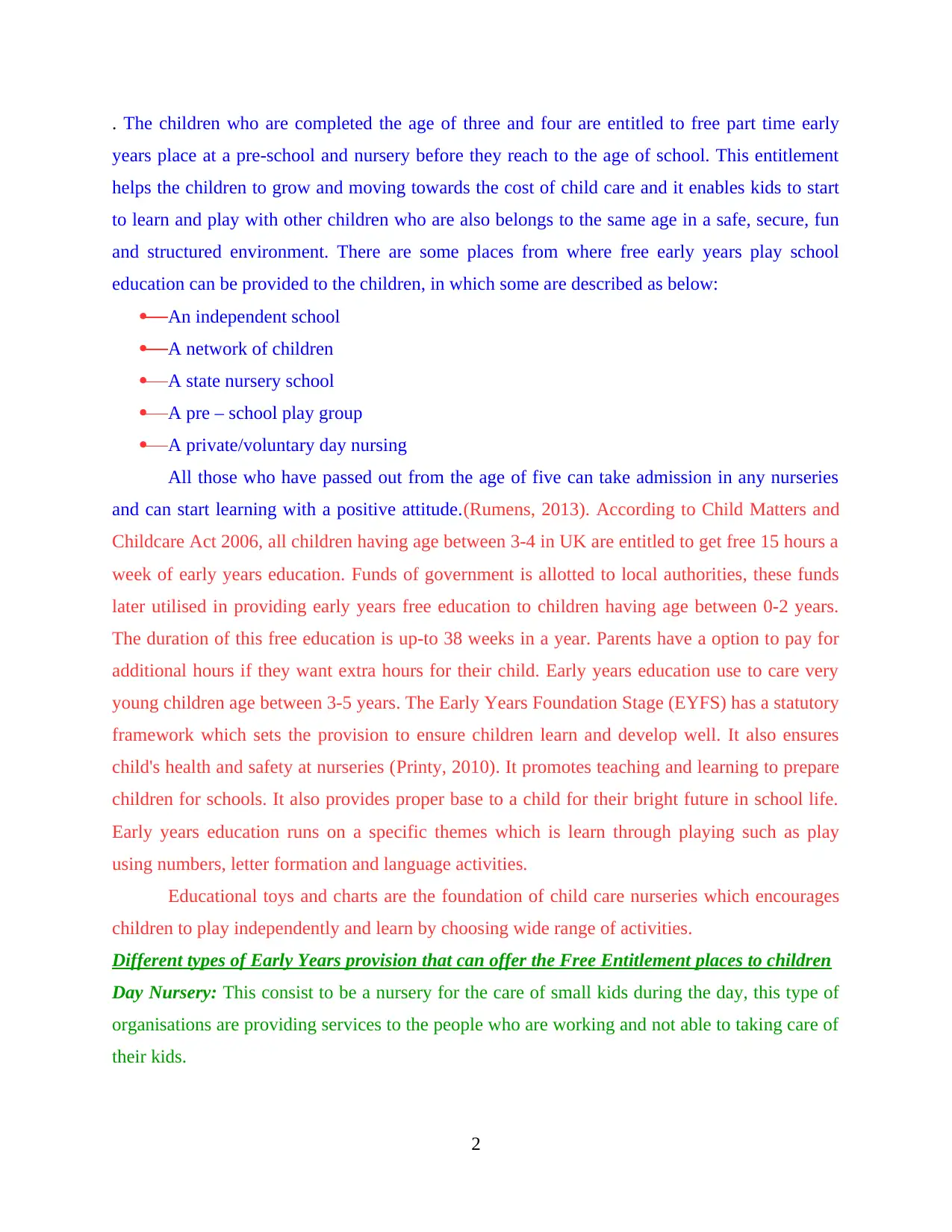
. The children who are completed the age of three and four are entitled to free part time early
years place at a pre-school and nursery before they reach to the age of school. This entitlement
helps the children to grow and moving towards the cost of child care and it enables kids to start
to learn and play with other children who are also belongs to the same age in a safe, secure, fun
and structured environment. There are some places from where free early years play school
education can be provided to the children, in which some are described as below:
An independent school
A network of children
A state nursery school
A pre – school play group
A private/voluntary day nursing
All those who have passed out from the age of five can take admission in any nurseries
and can start learning with a positive attitude.(Rumens, 2013). According to Child Matters and
Childcare Act 2006, all children having age between 3-4 in UK are entitled to get free 15 hours a
week of early years education. Funds of government is allotted to local authorities, these funds
later utilised in providing early years free education to children having age between 0-2 years.
The duration of this free education is up-to 38 weeks in a year. Parents have a option to pay for
additional hours if they want extra hours for their child. Early years education use to care very
young children age between 3-5 years. The Early Years Foundation Stage (EYFS) has a statutory
framework which sets the provision to ensure children learn and develop well. It also ensures
child's health and safety at nurseries (Printy, 2010). It promotes teaching and learning to prepare
children for schools. It also provides proper base to a child for their bright future in school life.
Early years education runs on a specific themes which is learn through playing such as play
using numbers, letter formation and language activities.
Educational toys and charts are the foundation of child care nurseries which encourages
children to play independently and learn by choosing wide range of activities.
Different types of Early Years provision that can offer the Free Entitlement places to children
Day Nursery: This consist to be a nursery for the care of small kids during the day, this type of
organisations are providing services to the people who are working and not able to taking care of
their kids.
2
years place at a pre-school and nursery before they reach to the age of school. This entitlement
helps the children to grow and moving towards the cost of child care and it enables kids to start
to learn and play with other children who are also belongs to the same age in a safe, secure, fun
and structured environment. There are some places from where free early years play school
education can be provided to the children, in which some are described as below:
An independent school
A network of children
A state nursery school
A pre – school play group
A private/voluntary day nursing
All those who have passed out from the age of five can take admission in any nurseries
and can start learning with a positive attitude.(Rumens, 2013). According to Child Matters and
Childcare Act 2006, all children having age between 3-4 in UK are entitled to get free 15 hours a
week of early years education. Funds of government is allotted to local authorities, these funds
later utilised in providing early years free education to children having age between 0-2 years.
The duration of this free education is up-to 38 weeks in a year. Parents have a option to pay for
additional hours if they want extra hours for their child. Early years education use to care very
young children age between 3-5 years. The Early Years Foundation Stage (EYFS) has a statutory
framework which sets the provision to ensure children learn and develop well. It also ensures
child's health and safety at nurseries (Printy, 2010). It promotes teaching and learning to prepare
children for schools. It also provides proper base to a child for their bright future in school life.
Early years education runs on a specific themes which is learn through playing such as play
using numbers, letter formation and language activities.
Educational toys and charts are the foundation of child care nurseries which encourages
children to play independently and learn by choosing wide range of activities.
Different types of Early Years provision that can offer the Free Entitlement places to children
Day Nursery: This consist to be a nursery for the care of small kids during the day, this type of
organisations are providing services to the people who are working and not able to taking care of
their kids.
2
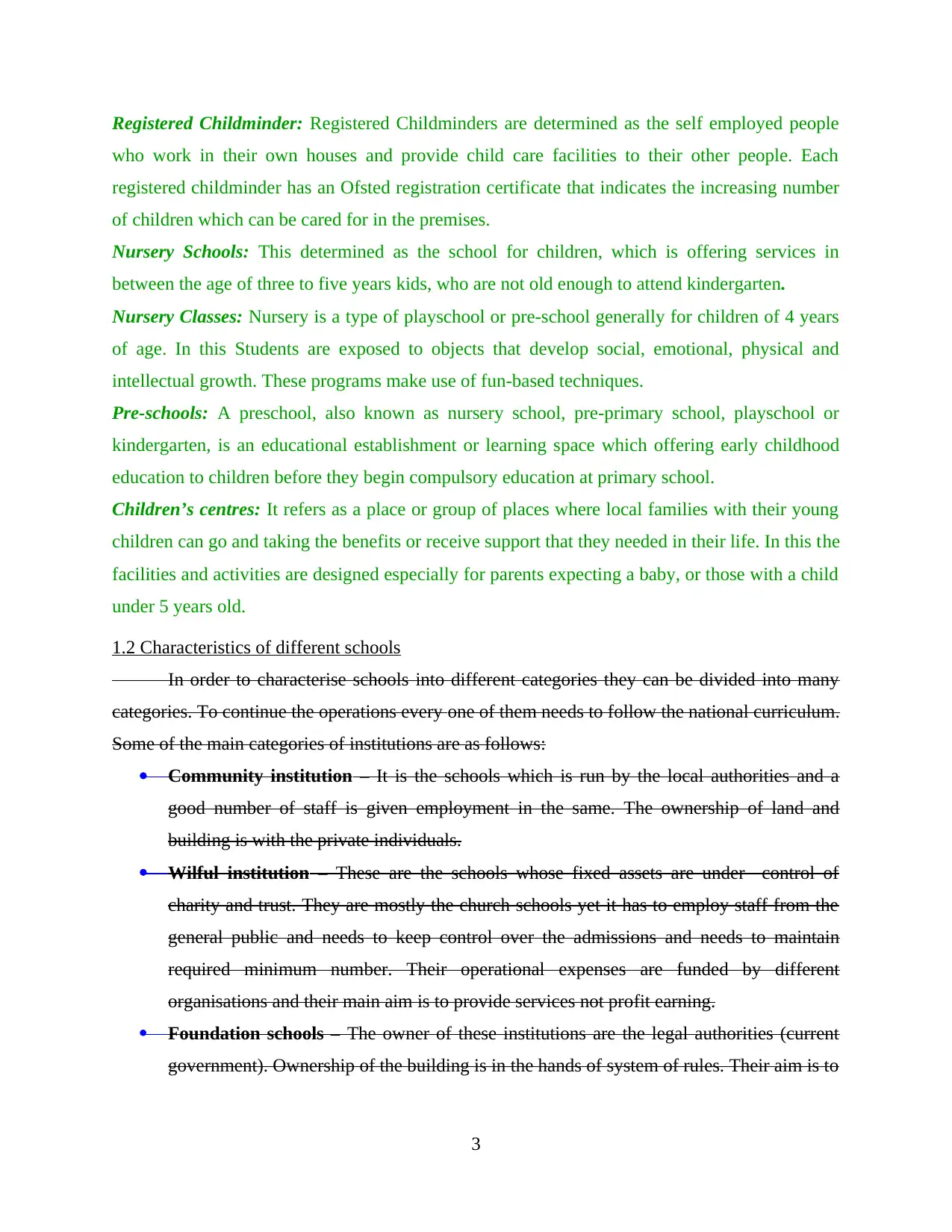
Registered Childminder: Registered Childminders are determined as the self employed people
who work in their own houses and provide child care facilities to their other people. Each
registered childminder has an Ofsted registration certificate that indicates the increasing number
of children which can be cared for in the premises.
Nursery Schools: This determined as the school for children, which is offering services in
between the age of three to five years kids, who are not old enough to attend kindergarten.
Nursery Classes: Nursery is a type of playschool or pre-school generally for children of 4 years
of age. In this Students are exposed to objects that develop social, emotional, physical and
intellectual growth. These programs make use of fun-based techniques.
Pre-schools: A preschool, also known as nursery school, pre-primary school, playschool or
kindergarten, is an educational establishment or learning space which offering early childhood
education to children before they begin compulsory education at primary school.
Children’s centres: It refers as a place or group of places where local families with their young
children can go and taking the benefits or receive support that they needed in their life. In this the
facilities and activities are designed especially for parents expecting a baby, or those with a child
under 5 years old.
1.2 Characteristics of different schools
In order to characterise schools into different categories they can be divided into many
categories. To continue the operations every one of them needs to follow the national curriculum.
Some of the main categories of institutions are as follows:
Community institution – It is the schools which is run by the local authorities and a
good number of staff is given employment in the same. The ownership of land and
building is with the private individuals.
Wilful institution – These are the schools whose fixed assets are under control of
charity and trust. They are mostly the church schools yet it has to employ staff from the
general public and needs to keep control over the admissions and needs to maintain
required minimum number. Their operational expenses are funded by different
organisations and their main aim is to provide services not profit earning.
Foundation schools – The owner of these institutions are the legal authorities (current
government). Ownership of the building is in the hands of system of rules. Their aim is to
3
who work in their own houses and provide child care facilities to their other people. Each
registered childminder has an Ofsted registration certificate that indicates the increasing number
of children which can be cared for in the premises.
Nursery Schools: This determined as the school for children, which is offering services in
between the age of three to five years kids, who are not old enough to attend kindergarten.
Nursery Classes: Nursery is a type of playschool or pre-school generally for children of 4 years
of age. In this Students are exposed to objects that develop social, emotional, physical and
intellectual growth. These programs make use of fun-based techniques.
Pre-schools: A preschool, also known as nursery school, pre-primary school, playschool or
kindergarten, is an educational establishment or learning space which offering early childhood
education to children before they begin compulsory education at primary school.
Children’s centres: It refers as a place or group of places where local families with their young
children can go and taking the benefits or receive support that they needed in their life. In this the
facilities and activities are designed especially for parents expecting a baby, or those with a child
under 5 years old.
1.2 Characteristics of different schools
In order to characterise schools into different categories they can be divided into many
categories. To continue the operations every one of them needs to follow the national curriculum.
Some of the main categories of institutions are as follows:
Community institution – It is the schools which is run by the local authorities and a
good number of staff is given employment in the same. The ownership of land and
building is with the private individuals.
Wilful institution – These are the schools whose fixed assets are under control of
charity and trust. They are mostly the church schools yet it has to employ staff from the
general public and needs to keep control over the admissions and needs to maintain
required minimum number. Their operational expenses are funded by different
organisations and their main aim is to provide services not profit earning.
Foundation schools – The owner of these institutions are the legal authorities (current
government). Ownership of the building is in the hands of system of rules. Their aim is to
3
⊘ This is a preview!⊘
Do you want full access?
Subscribe today to unlock all pages.

Trusted by 1+ million students worldwide
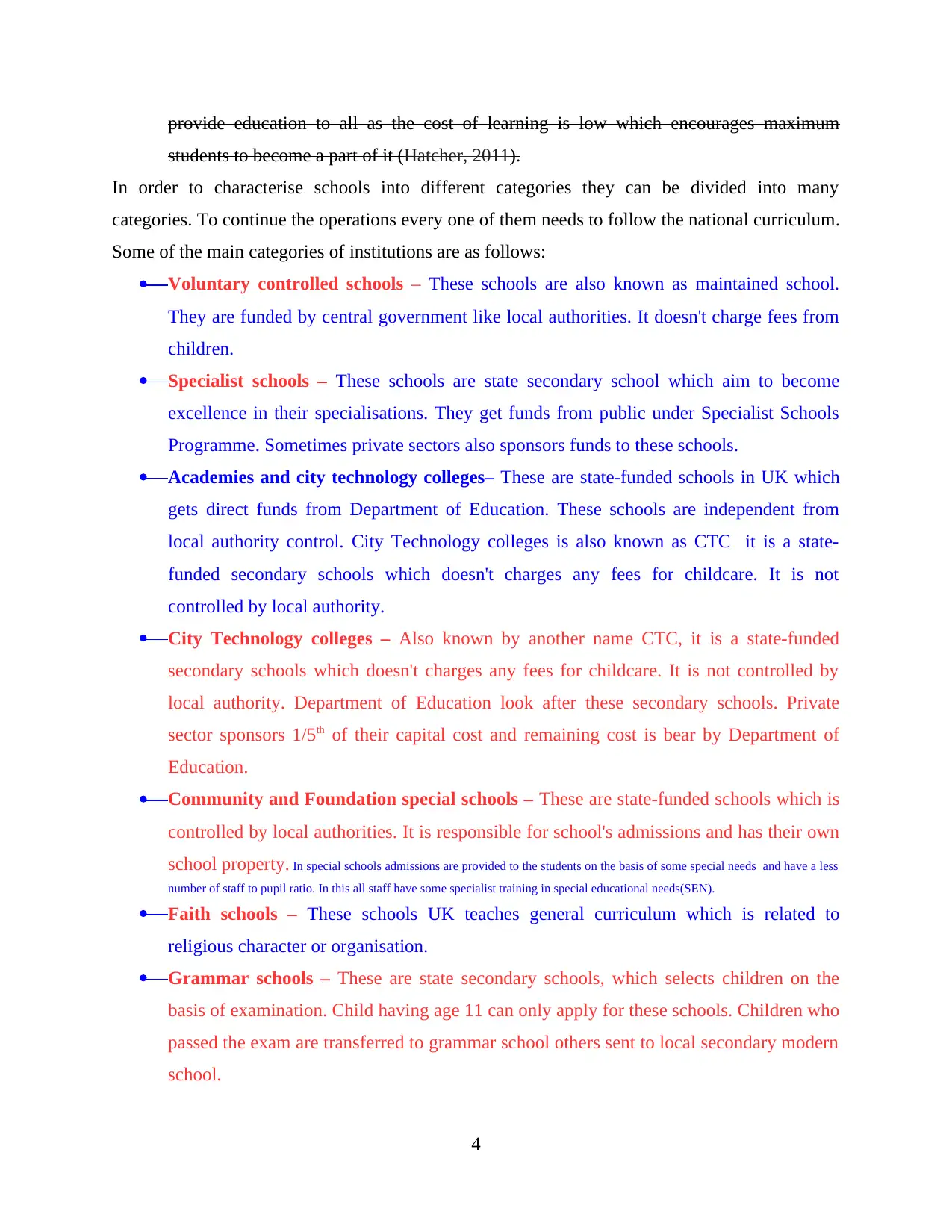
provide education to all as the cost of learning is low which encourages maximum
students to become a part of it (Hatcher, 2011).
In order to characterise schools into different categories they can be divided into many
categories. To continue the operations every one of them needs to follow the national curriculum.
Some of the main categories of institutions are as follows:
Voluntary controlled schools – These schools are also known as maintained school.
They are funded by central government like local authorities. It doesn't charge fees from
children.
Specialist schools – These schools are state secondary school which aim to become
excellence in their specialisations. They get funds from public under Specialist Schools
Programme. Sometimes private sectors also sponsors funds to these schools.
Academies and city technology colleges– These are state-funded schools in UK which
gets direct funds from Department of Education. These schools are independent from
local authority control. City Technology colleges is also known as CTC it is a state-
funded secondary schools which doesn't charges any fees for childcare. It is not
controlled by local authority.
City Technology colleges – Also known by another name CTC, it is a state-funded
secondary schools which doesn't charges any fees for childcare. It is not controlled by
local authority. Department of Education look after these secondary schools. Private
sector sponsors 1/5th of their capital cost and remaining cost is bear by Department of
Education.
Community and Foundation special schools – These are state-funded schools which is
controlled by local authorities. It is responsible for school's admissions and has their own
school property. In special schools admissions are provided to the students on the basis of some special needs and have a less
number of staff to pupil ratio. In this all staff have some specialist training in special educational needs(SEN).
Faith schools – These schools UK teaches general curriculum which is related to
religious character or organisation.
Grammar schools – These are state secondary schools, which selects children on the
basis of examination. Child having age 11 can only apply for these schools. Children who
passed the exam are transferred to grammar school others sent to local secondary modern
school.
4
students to become a part of it (Hatcher, 2011).
In order to characterise schools into different categories they can be divided into many
categories. To continue the operations every one of them needs to follow the national curriculum.
Some of the main categories of institutions are as follows:
Voluntary controlled schools – These schools are also known as maintained school.
They are funded by central government like local authorities. It doesn't charge fees from
children.
Specialist schools – These schools are state secondary school which aim to become
excellence in their specialisations. They get funds from public under Specialist Schools
Programme. Sometimes private sectors also sponsors funds to these schools.
Academies and city technology colleges– These are state-funded schools in UK which
gets direct funds from Department of Education. These schools are independent from
local authority control. City Technology colleges is also known as CTC it is a state-
funded secondary schools which doesn't charges any fees for childcare. It is not
controlled by local authority.
City Technology colleges – Also known by another name CTC, it is a state-funded
secondary schools which doesn't charges any fees for childcare. It is not controlled by
local authority. Department of Education look after these secondary schools. Private
sector sponsors 1/5th of their capital cost and remaining cost is bear by Department of
Education.
Community and Foundation special schools – These are state-funded schools which is
controlled by local authorities. It is responsible for school's admissions and has their own
school property. In special schools admissions are provided to the students on the basis of some special needs and have a less
number of staff to pupil ratio. In this all staff have some specialist training in special educational needs(SEN).
Faith schools – These schools UK teaches general curriculum which is related to
religious character or organisation.
Grammar schools – These are state secondary schools, which selects children on the
basis of examination. Child having age 11 can only apply for these schools. Children who
passed the exam are transferred to grammar school others sent to local secondary modern
school.
4
Paraphrase This Document
Need a fresh take? Get an instant paraphrase of this document with our AI Paraphraser
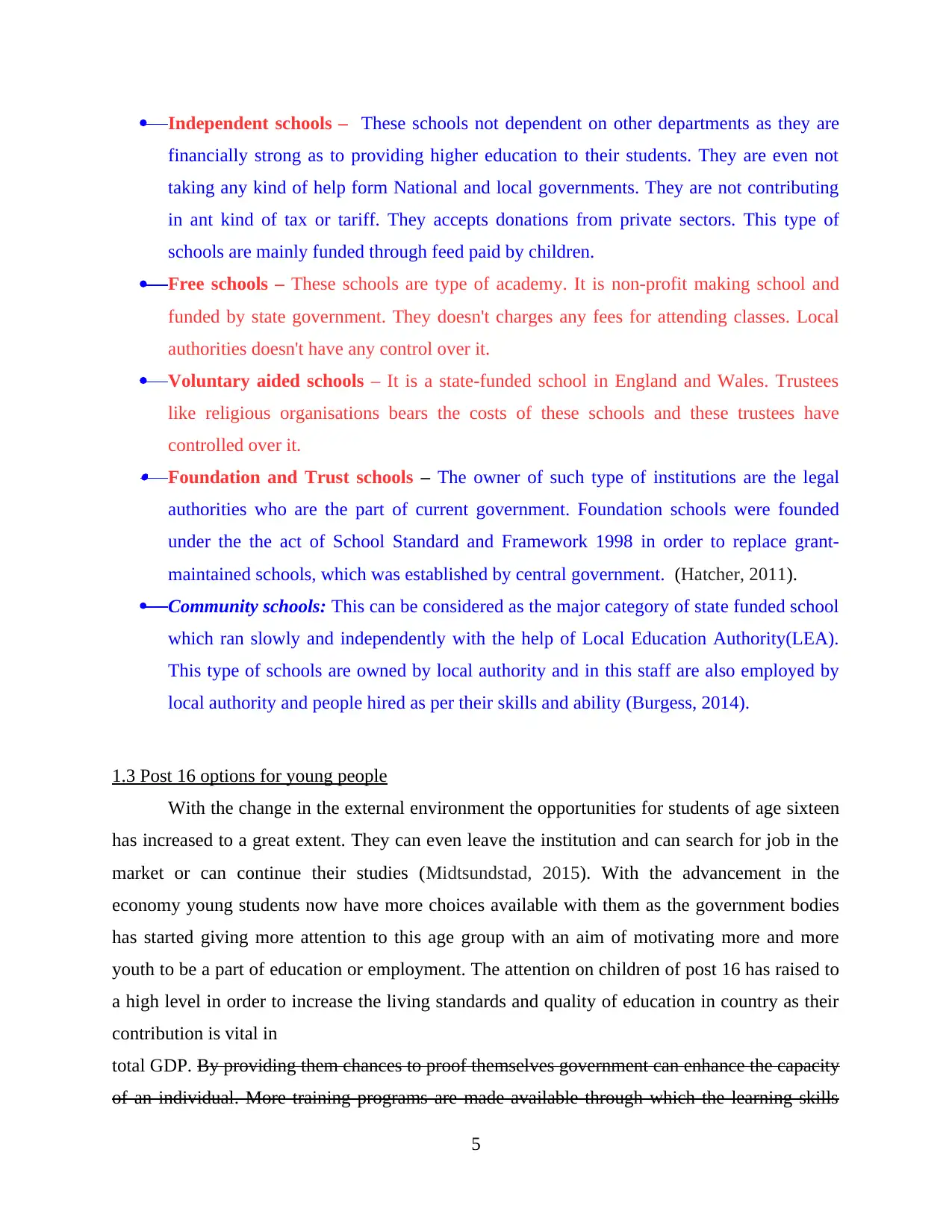
Independent schools – These schools not dependent on other departments as they are
financially strong as to providing higher education to their students. They are even not
taking any kind of help form National and local governments. They are not contributing
in ant kind of tax or tariff. They accepts donations from private sectors. This type of
schools are mainly funded through feed paid by children.
Free schools – These schools are type of academy. It is non-profit making school and
funded by state government. They doesn't charges any fees for attending classes. Local
authorities doesn't have any control over it.
Voluntary aided schools – It is a state-funded school in England and Wales. Trustees
like religious organisations bears the costs of these schools and these trustees have
controlled over it. Foundation and Trust schools – The owner of such type of institutions are the legal
authorities who are the part of current government. Foundation schools were founded
under the the act of School Standard and Framework 1998 in order to replace grant-
maintained schools, which was established by central government. (Hatcher, 2011).
Community schools: This can be considered as the major category of state funded school
which ran slowly and independently with the help of Local Education Authority(LEA).
This type of schools are owned by local authority and in this staff are also employed by
local authority and people hired as per their skills and ability (Burgess, 2014).
1.3 Post 16 options for young people
With the change in the external environment the opportunities for students of age sixteen
has increased to a great extent. They can even leave the institution and can search for job in the
market or can continue their studies (Midtsundstad, 2015). With the advancement in the
economy young students now have more choices available with them as the government bodies
has started giving more attention to this age group with an aim of motivating more and more
youth to be a part of education or employment. The attention on children of post 16 has raised to
a high level in order to increase the living standards and quality of education in country as their
contribution is vital in
total GDP. By providing them chances to proof themselves government can enhance the capacity
of an individual. More training programs are made available through which the learning skills
5
financially strong as to providing higher education to their students. They are even not
taking any kind of help form National and local governments. They are not contributing
in ant kind of tax or tariff. They accepts donations from private sectors. This type of
schools are mainly funded through feed paid by children.
Free schools – These schools are type of academy. It is non-profit making school and
funded by state government. They doesn't charges any fees for attending classes. Local
authorities doesn't have any control over it.
Voluntary aided schools – It is a state-funded school in England and Wales. Trustees
like religious organisations bears the costs of these schools and these trustees have
controlled over it. Foundation and Trust schools – The owner of such type of institutions are the legal
authorities who are the part of current government. Foundation schools were founded
under the the act of School Standard and Framework 1998 in order to replace grant-
maintained schools, which was established by central government. (Hatcher, 2011).
Community schools: This can be considered as the major category of state funded school
which ran slowly and independently with the help of Local Education Authority(LEA).
This type of schools are owned by local authority and in this staff are also employed by
local authority and people hired as per their skills and ability (Burgess, 2014).
1.3 Post 16 options for young people
With the change in the external environment the opportunities for students of age sixteen
has increased to a great extent. They can even leave the institution and can search for job in the
market or can continue their studies (Midtsundstad, 2015). With the advancement in the
economy young students now have more choices available with them as the government bodies
has started giving more attention to this age group with an aim of motivating more and more
youth to be a part of education or employment. The attention on children of post 16 has raised to
a high level in order to increase the living standards and quality of education in country as their
contribution is vital in
total GDP. By providing them chances to proof themselves government can enhance the capacity
of an individual. More training programs are made available through which the learning skills
5
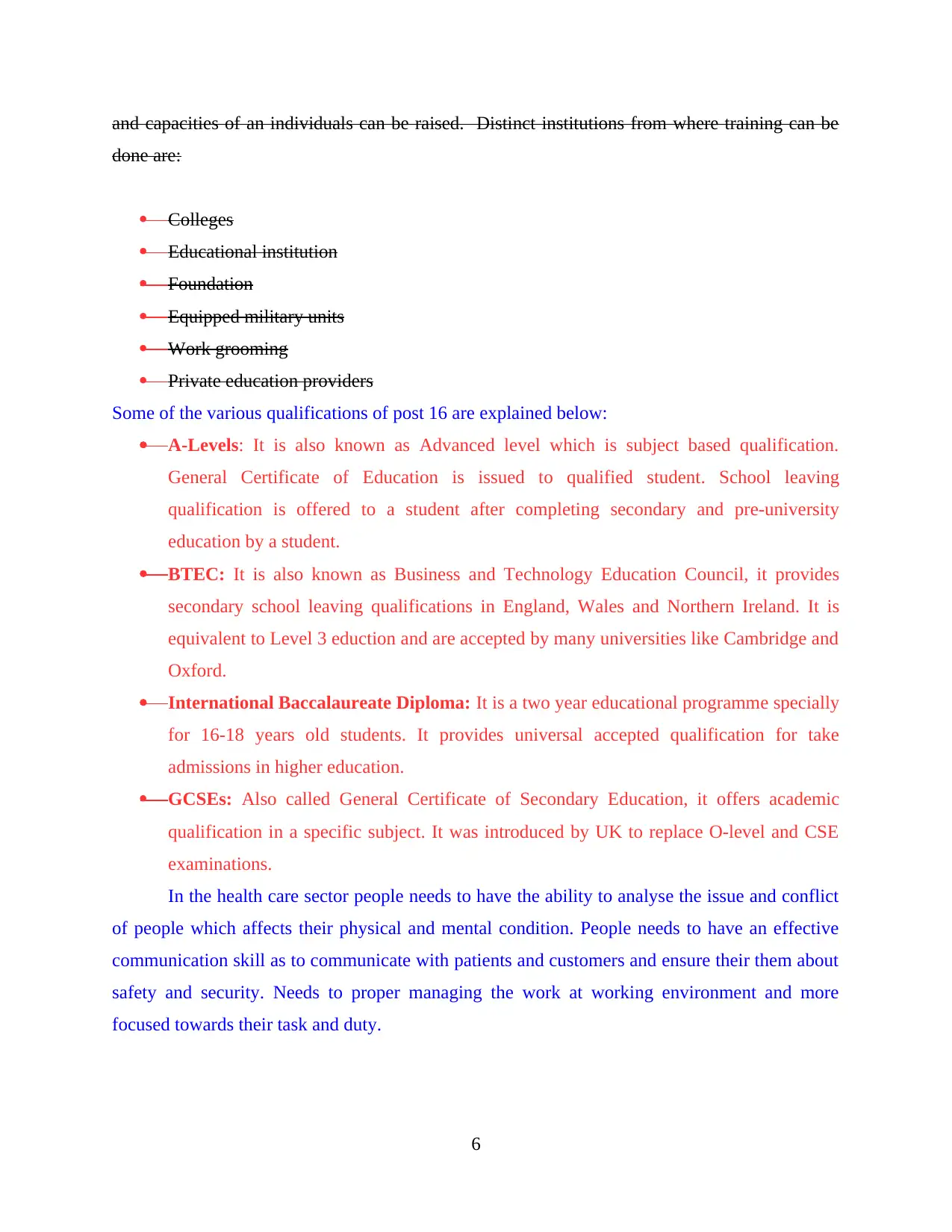
and capacities of an individuals can be raised. Distinct institutions from where training can be
done are:
Colleges
Educational institution
Foundation
Equipped military units
Work grooming
Private education providers
Some of the various qualifications of post 16 are explained below:
A-Levels: It is also known as Advanced level which is subject based qualification.
General Certificate of Education is issued to qualified student. School leaving
qualification is offered to a student after completing secondary and pre-university
education by a student.
BTEC: It is also known as Business and Technology Education Council, it provides
secondary school leaving qualifications in England, Wales and Northern Ireland. It is
equivalent to Level 3 eduction and are accepted by many universities like Cambridge and
Oxford.
International Baccalaureate Diploma: It is a two year educational programme specially
for 16-18 years old students. It provides universal accepted qualification for take
admissions in higher education.
GCSEs: Also called General Certificate of Secondary Education, it offers academic
qualification in a specific subject. It was introduced by UK to replace O-level and CSE
examinations.
In the health care sector people needs to have the ability to analyse the issue and conflict
of people which affects their physical and mental condition. People needs to have an effective
communication skill as to communicate with patients and customers and ensure their them about
safety and security. Needs to proper managing the work at working environment and more
focused towards their task and duty.
6
done are:
Colleges
Educational institution
Foundation
Equipped military units
Work grooming
Private education providers
Some of the various qualifications of post 16 are explained below:
A-Levels: It is also known as Advanced level which is subject based qualification.
General Certificate of Education is issued to qualified student. School leaving
qualification is offered to a student after completing secondary and pre-university
education by a student.
BTEC: It is also known as Business and Technology Education Council, it provides
secondary school leaving qualifications in England, Wales and Northern Ireland. It is
equivalent to Level 3 eduction and are accepted by many universities like Cambridge and
Oxford.
International Baccalaureate Diploma: It is a two year educational programme specially
for 16-18 years old students. It provides universal accepted qualification for take
admissions in higher education.
GCSEs: Also called General Certificate of Secondary Education, it offers academic
qualification in a specific subject. It was introduced by UK to replace O-level and CSE
examinations.
In the health care sector people needs to have the ability to analyse the issue and conflict
of people which affects their physical and mental condition. People needs to have an effective
communication skill as to communicate with patients and customers and ensure their them about
safety and security. Needs to proper managing the work at working environment and more
focused towards their task and duty.
6
⊘ This is a preview!⊘
Do you want full access?
Subscribe today to unlock all pages.

Trusted by 1+ million students worldwide
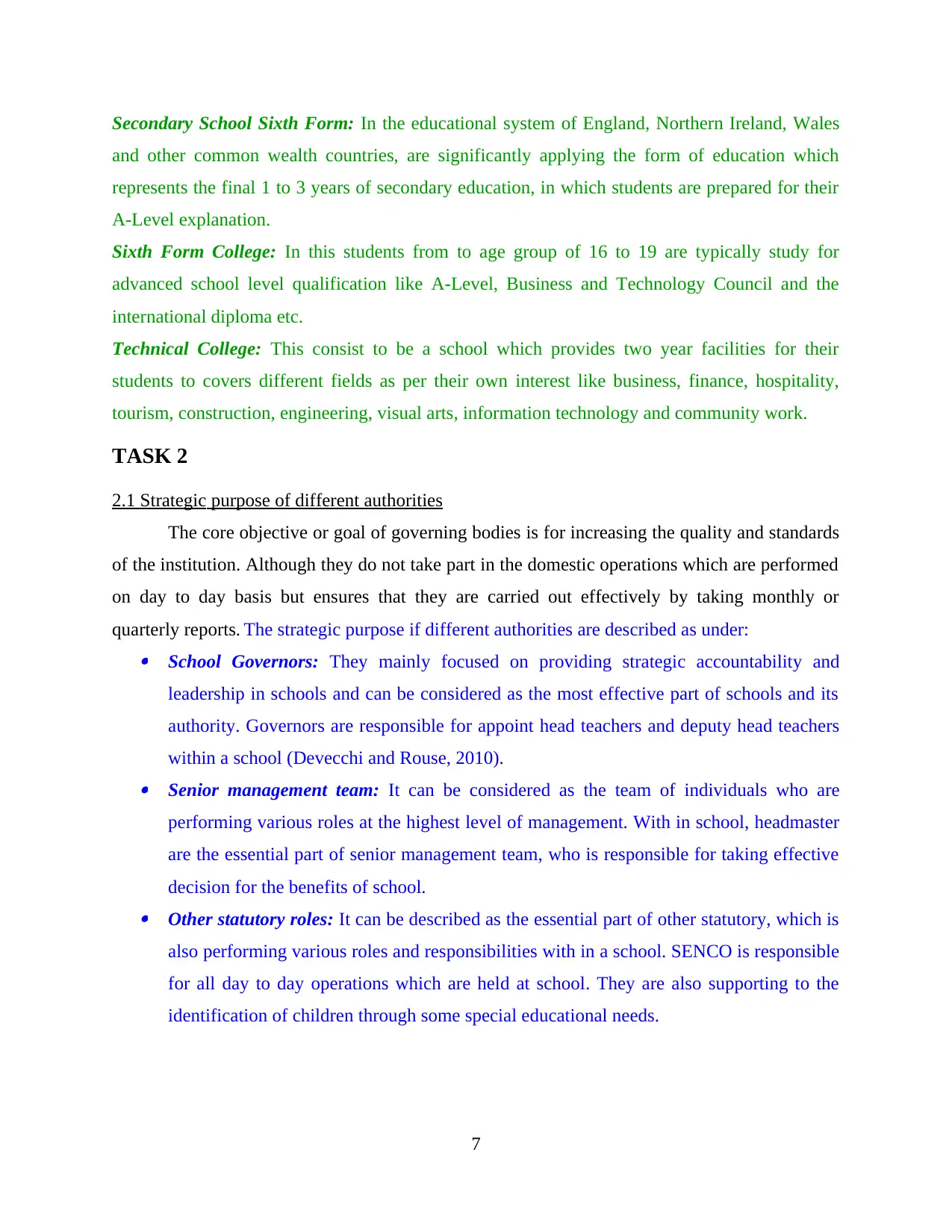
Secondary School Sixth Form: In the educational system of England, Northern Ireland, Wales
and other common wealth countries, are significantly applying the form of education which
represents the final 1 to 3 years of secondary education, in which students are prepared for their
A-Level explanation.
Sixth Form College: In this students from to age group of 16 to 19 are typically study for
advanced school level qualification like A-Level, Business and Technology Council and the
international diploma etc.
Technical College: This consist to be a school which provides two year facilities for their
students to covers different fields as per their own interest like business, finance, hospitality,
tourism, construction, engineering, visual arts, information technology and community work.
TASK 2
2.1 Strategic purpose of different authorities
The core objective or goal of governing bodies is for increasing the quality and standards
of the institution. Although they do not take part in the domestic operations which are performed
on day to day basis but ensures that they are carried out effectively by taking monthly or
quarterly reports. The strategic purpose if different authorities are described as under: School Governors: They mainly focused on providing strategic accountability and
leadership in schools and can be considered as the most effective part of schools and its
authority. Governors are responsible for appoint head teachers and deputy head teachers
within a school (Devecchi and Rouse, 2010). Senior management team: It can be considered as the team of individuals who are
performing various roles at the highest level of management. With in school, headmaster
are the essential part of senior management team, who is responsible for taking effective
decision for the benefits of school. Other statutory roles: It can be described as the essential part of other statutory, which is
also performing various roles and responsibilities with in a school. SENCO is responsible
for all day to day operations which are held at school. They are also supporting to the
identification of children through some special educational needs.
7
and other common wealth countries, are significantly applying the form of education which
represents the final 1 to 3 years of secondary education, in which students are prepared for their
A-Level explanation.
Sixth Form College: In this students from to age group of 16 to 19 are typically study for
advanced school level qualification like A-Level, Business and Technology Council and the
international diploma etc.
Technical College: This consist to be a school which provides two year facilities for their
students to covers different fields as per their own interest like business, finance, hospitality,
tourism, construction, engineering, visual arts, information technology and community work.
TASK 2
2.1 Strategic purpose of different authorities
The core objective or goal of governing bodies is for increasing the quality and standards
of the institution. Although they do not take part in the domestic operations which are performed
on day to day basis but ensures that they are carried out effectively by taking monthly or
quarterly reports. The strategic purpose if different authorities are described as under: School Governors: They mainly focused on providing strategic accountability and
leadership in schools and can be considered as the most effective part of schools and its
authority. Governors are responsible for appoint head teachers and deputy head teachers
within a school (Devecchi and Rouse, 2010). Senior management team: It can be considered as the team of individuals who are
performing various roles at the highest level of management. With in school, headmaster
are the essential part of senior management team, who is responsible for taking effective
decision for the benefits of school. Other statutory roles: It can be described as the essential part of other statutory, which is
also performing various roles and responsibilities with in a school. SENCO is responsible
for all day to day operations which are held at school. They are also supporting to the
identification of children through some special educational needs.
7
Paraphrase This Document
Need a fresh take? Get an instant paraphrase of this document with our AI Paraphraser
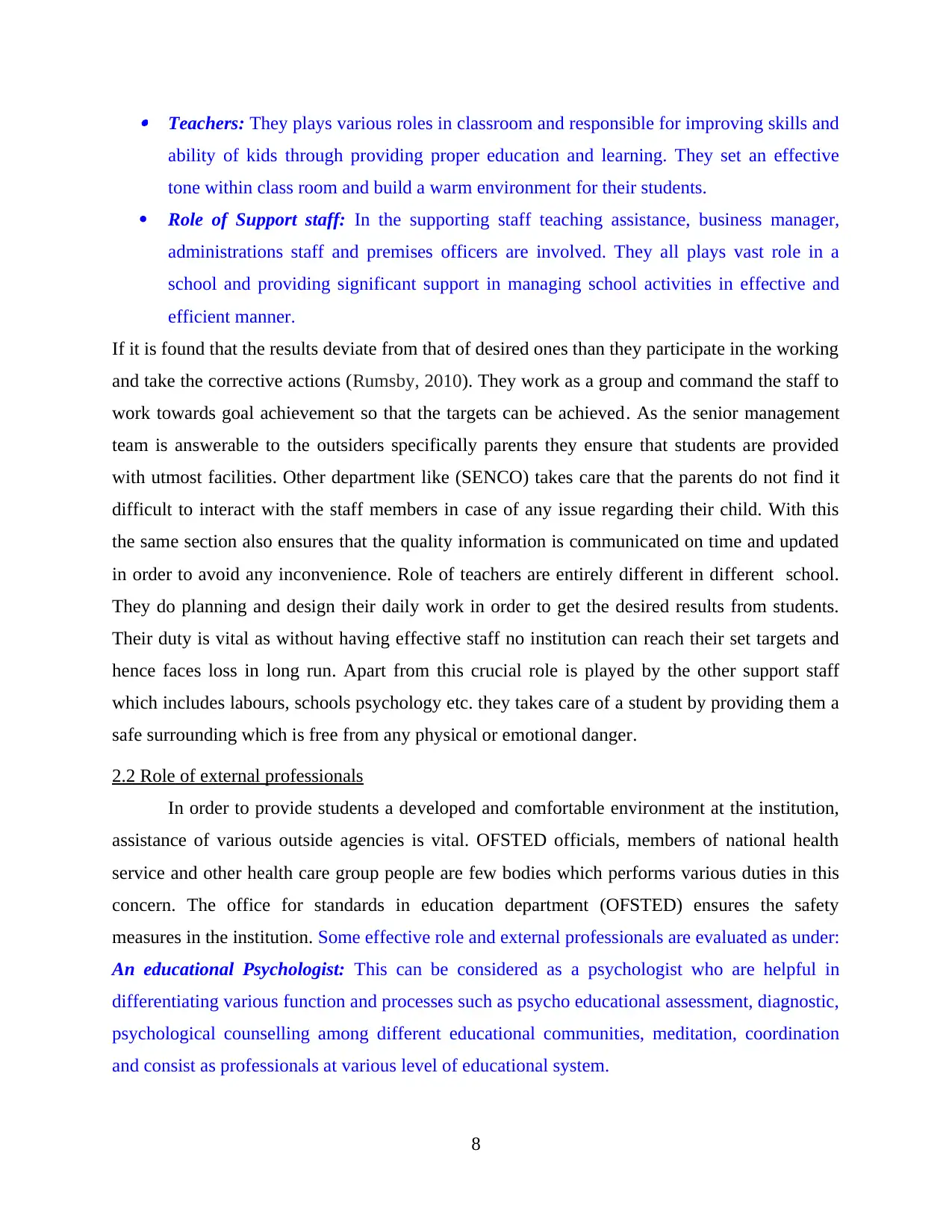
Teachers: They plays various roles in classroom and responsible for improving skills and
ability of kids through providing proper education and learning. They set an effective
tone within class room and build a warm environment for their students.
Role of Support staff: In the supporting staff teaching assistance, business manager,
administrations staff and premises officers are involved. They all plays vast role in a
school and providing significant support in managing school activities in effective and
efficient manner.
If it is found that the results deviate from that of desired ones than they participate in the working
and take the corrective actions (Rumsby, 2010). They work as a group and command the staff to
work towards goal achievement so that the targets can be achieved. As the senior management
team is answerable to the outsiders specifically parents they ensure that students are provided
with utmost facilities. Other department like (SENCO) takes care that the parents do not find it
difficult to interact with the staff members in case of any issue regarding their child. With this
the same section also ensures that the quality information is communicated on time and updated
in order to avoid any inconvenience. Role of teachers are entirely different in different school.
They do planning and design their daily work in order to get the desired results from students.
Their duty is vital as without having effective staff no institution can reach their set targets and
hence faces loss in long run. Apart from this crucial role is played by the other support staff
which includes labours, schools psychology etc. they takes care of a student by providing them a
safe surrounding which is free from any physical or emotional danger.
2.2 Role of external professionals
In order to provide students a developed and comfortable environment at the institution,
assistance of various outside agencies is vital. OFSTED officials, members of national health
service and other health care group people are few bodies which performs various duties in this
concern. The office for standards in education department (OFSTED) ensures the safety
measures in the institution. Some effective role and external professionals are evaluated as under:
An educational Psychologist: This can be considered as a psychologist who are helpful in
differentiating various function and processes such as psycho educational assessment, diagnostic,
psychological counselling among different educational communities, meditation, coordination
and consist as professionals at various level of educational system.
8
ability of kids through providing proper education and learning. They set an effective
tone within class room and build a warm environment for their students.
Role of Support staff: In the supporting staff teaching assistance, business manager,
administrations staff and premises officers are involved. They all plays vast role in a
school and providing significant support in managing school activities in effective and
efficient manner.
If it is found that the results deviate from that of desired ones than they participate in the working
and take the corrective actions (Rumsby, 2010). They work as a group and command the staff to
work towards goal achievement so that the targets can be achieved. As the senior management
team is answerable to the outsiders specifically parents they ensure that students are provided
with utmost facilities. Other department like (SENCO) takes care that the parents do not find it
difficult to interact with the staff members in case of any issue regarding their child. With this
the same section also ensures that the quality information is communicated on time and updated
in order to avoid any inconvenience. Role of teachers are entirely different in different school.
They do planning and design their daily work in order to get the desired results from students.
Their duty is vital as without having effective staff no institution can reach their set targets and
hence faces loss in long run. Apart from this crucial role is played by the other support staff
which includes labours, schools psychology etc. they takes care of a student by providing them a
safe surrounding which is free from any physical or emotional danger.
2.2 Role of external professionals
In order to provide students a developed and comfortable environment at the institution,
assistance of various outside agencies is vital. OFSTED officials, members of national health
service and other health care group people are few bodies which performs various duties in this
concern. The office for standards in education department (OFSTED) ensures the safety
measures in the institution. Some effective role and external professionals are evaluated as under:
An educational Psychologist: This can be considered as a psychologist who are helpful in
differentiating various function and processes such as psycho educational assessment, diagnostic,
psychological counselling among different educational communities, meditation, coordination
and consist as professionals at various level of educational system.
8
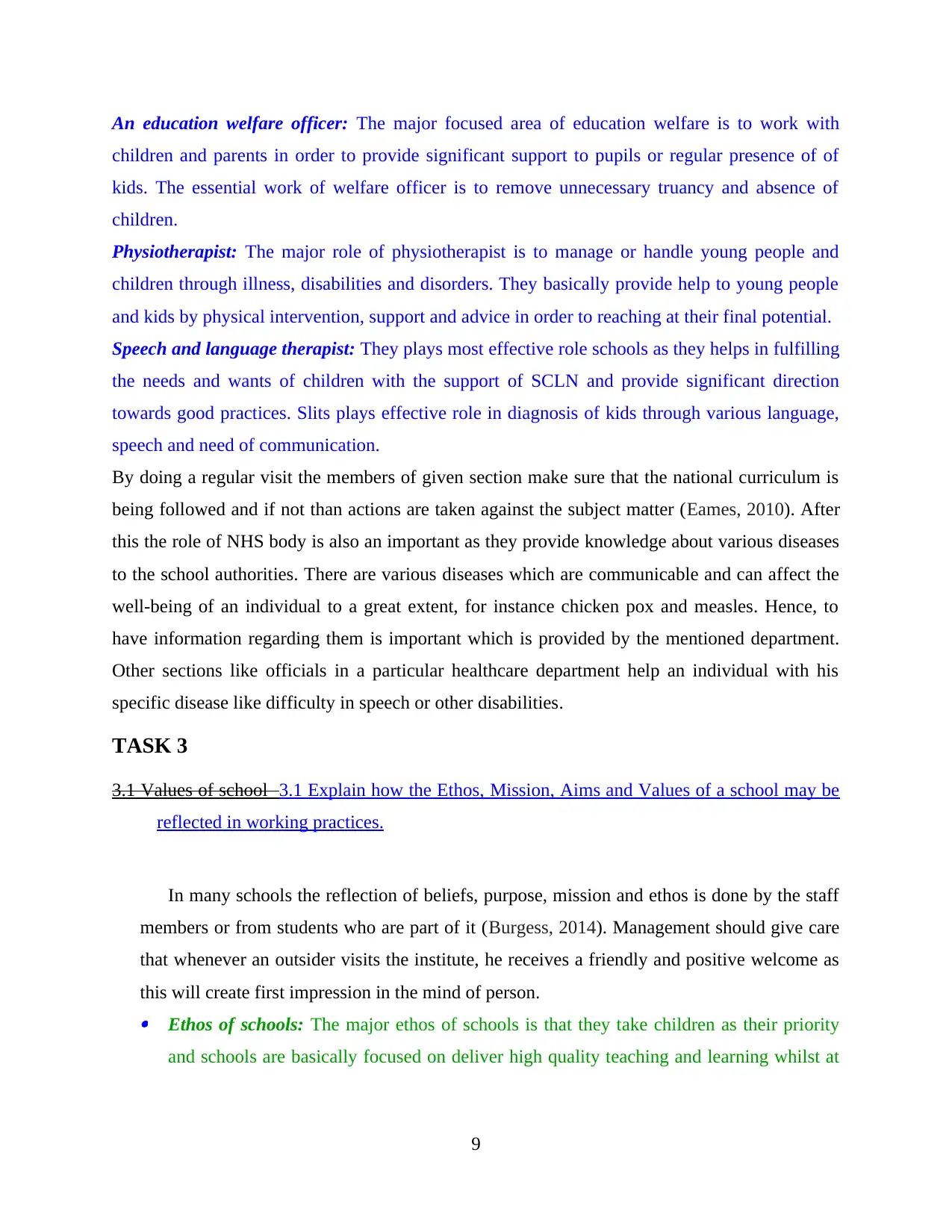
An education welfare officer: The major focused area of education welfare is to work with
children and parents in order to provide significant support to pupils or regular presence of of
kids. The essential work of welfare officer is to remove unnecessary truancy and absence of
children.
Physiotherapist: The major role of physiotherapist is to manage or handle young people and
children through illness, disabilities and disorders. They basically provide help to young people
and kids by physical intervention, support and advice in order to reaching at their final potential.
Speech and language therapist: They plays most effective role schools as they helps in fulfilling
the needs and wants of children with the support of SCLN and provide significant direction
towards good practices. Slits plays effective role in diagnosis of kids through various language,
speech and need of communication.
By doing a regular visit the members of given section make sure that the national curriculum is
being followed and if not than actions are taken against the subject matter (Eames, 2010). After
this the role of NHS body is also an important as they provide knowledge about various diseases
to the school authorities. There are various diseases which are communicable and can affect the
well-being of an individual to a great extent, for instance chicken pox and measles. Hence, to
have information regarding them is important which is provided by the mentioned department.
Other sections like officials in a particular healthcare department help an individual with his
specific disease like difficulty in speech or other disabilities.
TASK 3
3.1 Values of school 3.1 Explain how the Ethos, Mission, Aims and Values of a school may be
reflected in working practices.
In many schools the reflection of beliefs, purpose, mission and ethos is done by the staff
members or from students who are part of it (Burgess, 2014). Management should give care
that whenever an outsider visits the institute, he receives a friendly and positive welcome as
this will create first impression in the mind of person. Ethos of schools: The major ethos of schools is that they take children as their priority
and schools are basically focused on deliver high quality teaching and learning whilst at
9
children and parents in order to provide significant support to pupils or regular presence of of
kids. The essential work of welfare officer is to remove unnecessary truancy and absence of
children.
Physiotherapist: The major role of physiotherapist is to manage or handle young people and
children through illness, disabilities and disorders. They basically provide help to young people
and kids by physical intervention, support and advice in order to reaching at their final potential.
Speech and language therapist: They plays most effective role schools as they helps in fulfilling
the needs and wants of children with the support of SCLN and provide significant direction
towards good practices. Slits plays effective role in diagnosis of kids through various language,
speech and need of communication.
By doing a regular visit the members of given section make sure that the national curriculum is
being followed and if not than actions are taken against the subject matter (Eames, 2010). After
this the role of NHS body is also an important as they provide knowledge about various diseases
to the school authorities. There are various diseases which are communicable and can affect the
well-being of an individual to a great extent, for instance chicken pox and measles. Hence, to
have information regarding them is important which is provided by the mentioned department.
Other sections like officials in a particular healthcare department help an individual with his
specific disease like difficulty in speech or other disabilities.
TASK 3
3.1 Values of school 3.1 Explain how the Ethos, Mission, Aims and Values of a school may be
reflected in working practices.
In many schools the reflection of beliefs, purpose, mission and ethos is done by the staff
members or from students who are part of it (Burgess, 2014). Management should give care
that whenever an outsider visits the institute, he receives a friendly and positive welcome as
this will create first impression in the mind of person. Ethos of schools: The major ethos of schools is that they take children as their priority
and schools are basically focused on deliver high quality teaching and learning whilst at
9
⊘ This is a preview!⊘
Do you want full access?
Subscribe today to unlock all pages.

Trusted by 1+ million students worldwide
1 out of 31
Related Documents
Your All-in-One AI-Powered Toolkit for Academic Success.
+13062052269
info@desklib.com
Available 24*7 on WhatsApp / Email
![[object Object]](/_next/static/media/star-bottom.7253800d.svg)
Unlock your academic potential
Copyright © 2020–2026 A2Z Services. All Rights Reserved. Developed and managed by ZUCOL.





